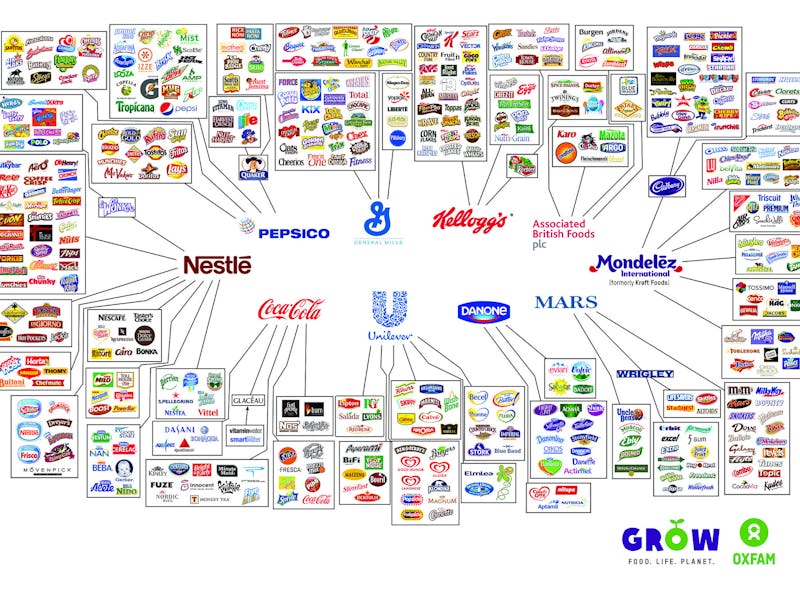Per the paradox of choice, the more options you’re presented with, the less happy you’ll be once you finally choose one. So if you’re paralyzed by indecision about which corporation to support with your snack dollars, fear not, because there are nowhere near as many options as you’d think.
In 2014, Oxfam mapped out the properties of 10 different corporations, from Coca-Cola to Kellogg’s, to demonstrate just how insular the realm of processed food can be. The resulting infographic is sometimes shocking. For instance, it is faintly distressing but wholly fascinating to know that the same corporation, Mondelēz International, produces Dentyne and Velveeta.
To know that 10 companies control most of the world’s bottled water, cheese snacks, frozen food, and cereal options is to experience a uniquely modern sense of existential dread. How can a consumer hope to make their money talk when spending is more equivalent to a scream into the void? Well, thankfully Nestle makes Hot Pockets.
If you’re feeling masochistic, here’s a quick breakdown of who owns what.
Coca-Cola
Hey, I'm an Aquarius!
The Coca-Cola breakdown doesn’t hold a ton of surprises. They stay in their lane and only produce other drinks, unlike those freaks over at PepsiCo. A little disappointing to see Odwalla under here but otherwise no earth-shattering information.
Mars
Mars makes Mars? Oh my god...
Hmmmm, Uncle Ben’s. Sure, all of these food items aren’t made with the same equipment or anything, but this is still a little bit suspect. Mars also has a very strong showing in the gum department. Good to know you’re not cheating on Doublemint when you chew Orbit.
Unilever
E tu, Ben & Jerry's?
Now we’re getting into “hurt feelings” territory, as the chart thoroughly shatters the romantic ideal of Ben & Jerry’s as an independent ice cream brand uninfluenced by corporate ghouls. Also, a little chart critique: Why is Slim-Fast in the same box at Bertolli, the pasta sauce, instead of near Lipton, Red Rose, and all of the other drinks? This portion of the chart is also a chilling reminder that, unfortunately, Marmite exists.
PepsiCo
Crazy that every single thing a middle school boy eats is represented here.
Wow, is that the entire chip spectrum? PepsiCo owns way fewer drink brands than anticipated and goes pretty hard in the breakfast department. Also didn’t know that SoBe was still around, so that’s an interesting wrinkle.
Danone
Mmm, yogurt.
Danone naming four of its yogurts Dannon, Danacol, Danonino, and Danette is like the Duggar family forcing “j” names onto all 19 of their kids (and counting). Handy branding but ultimately not cute.
General Mills
Great, now I'm craving Gushers.
It’s unclear if General Mills invented the art of the plastic-textured fruit snack or if they simply perfected it, but this lucky corporation owns the holy trinity: Fruit by the Foot, Gushers, and Foot Roll-Ups. Also, in a shocking oversight, Chex Mix does not appear to have made it to this portion of the chart. Mysterious.
Associated British Foods
Oy, bruv!
This corporation’s name does warn consumers that these foods are unmistakably British and will be irrevocably associated with one another. But just because a corporation is courteous doesn’t mean that it isn’t still insidious. Oxfam sees you, Associated British Foods.
Kellogg’s
Remember putting two Pringles in your mouth so it looked like you had a duck bill? Classic sight gag.
One of these things is not like the others: Morningstar, the vegetarian food brand. Everything else is pretty par for the course in terms of what your friend’s tired mom would feed you the morning after a particularly raucous sleepover.
Mondelēz International
Mondelēz International does not deserve my big Toblerone!
It might seem more intuitive for Cadbury to be a part of Associated British Foods. That is, until you remember that in the crazy world of corporate snackage, intuition is garbage and nothing makes sense.
Nestlé
We're playing with the big boys now, aren't we?
Nestlé has some of the most diverse properties of any corporation on this list, and it also gets the most press for being actively evil. Their list of sins include believing access to water isn’t a human right, unethical labor practices, and food contamination scares. But damn if a Kit Kat doesn’t sound tempting right about now.
Because, above all, big companies know how to grab consumers where it hurts — right in the stomach.
